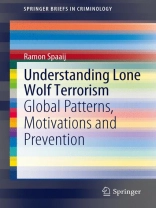What drives the lone wolf terrorist to commit mass violence? What are their ideologies and motivations? How do they plan and carry out their attacks, and who do they target? How can lone wolf terrorism be effectively countered? One of the first in-depth analyses of lone wolf terrorism, this publication sets out to answer these questions. Drawing on extensive international data and qualitative case studies, it examines the global patterns in and key features of lone wolf terrorism over the past four decades. This engaging text will be essential reading for students and researchers on terrorism and violent conflict and offers unique and invaluable insights to those working to prevent or minimize the effects of terrorism and political violence.
عن المؤلف
Ramón Spaaij is a Senior Research Fellow in the School of Social Sciences at La Trobe University, Australia, and the Amsterdam Institute for Social Science Research, University of Amsterdam. He has lectured at several universities in the areas of sociology, sport studies and conflict studies. Spaaij’s main research expertise is in the sociology of sport, social capital, socialization, social exclusion, and terrorism and political violence. He has published nine books including recent titles such as Sport and Social Mobility: Crossing Boundaries (Routledge, 2011) and The Social Impact of Sport: Cross-Cultural Perspectives (edited, Routledge, 2010). He is co-author of the book Trends in Terrorisme (Kluwer, 2003) and has published on various aspects of terrorism and political violence. His work has appeared in a wide range of international media.












